I have always been a massive fan of organizing my workspace. It helps me keep track of my work, relieving anxiety about future projects.
Even though an office setup is where you usually indulge in long work hours, a well-managed home office can increase your productivity.
It removes the tedious job of searching for a specific file when you are already in a rush. Therefore, helping you maintain a good speed of work.
Over the years, I have dived deep into hundreds of videos and blogs, which have assisted me in creating a stable home office filing system.
A sound home-office filing system consists of meticulous management of files, letters, and paperwork. Your filing system must be accessible, compact, flexible, simple, and well-categorized. It should not be difficult to remember what data is placed where and in what order.
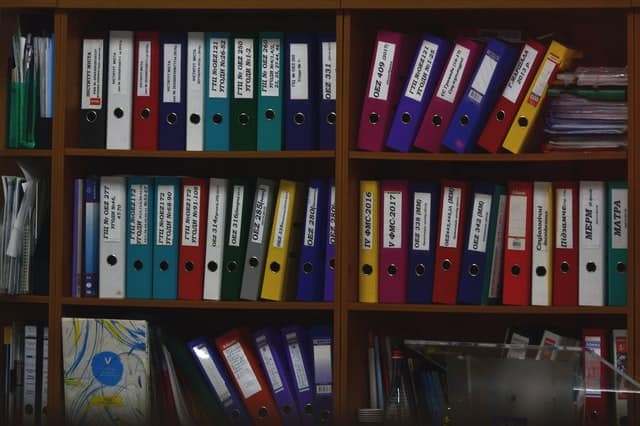
This article will guide you through valuable practical tips and tricks for everyone. Then, you can create a home office filing system precisely curated to your occupation and lifestyle.
Table of Contents Show
Why is Home Office Filing System Necessary?
Before we discuss how to build an effective system, we must learn why it is necessary in the first place.
1. Boosting your efficiency
If your system is up to date and sorted in chronological order, you can spend quality time solving the problem.
In addition, the time for finding a specific document is shortened. Hence, efficiency increases drastically.
Compared to your office, files at home are usually more vulnerable. You may easily misplace your files with other documents and forget about them.
Sometimes, your kids may mess around with these files when you are not home.
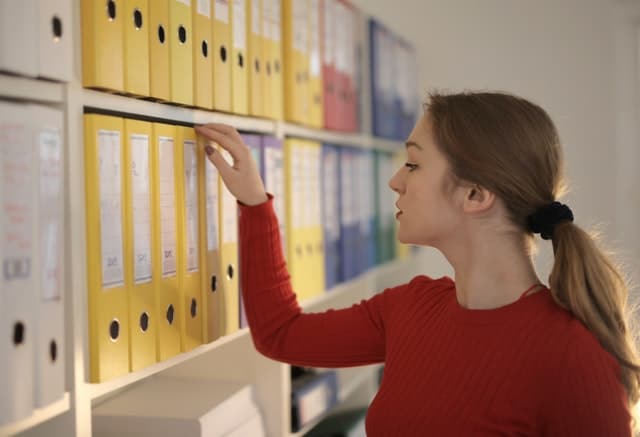
If you don’t put them safely, they can collect dust, be mishandled, and be damaged. Furthermore, this hinders you from making ethical decisions on time.
So, a home office filing system helps you to stay as productive as possible.
It keeps your right on track without having you flip through piles of paperwork, left and right, for hours. As a result, you stay organized and in control.
2. Record Keeping
Every move made in a business needs some physical or digital documentation.
You should keep your contracts with the organization safely at home to decrease the chances of miscommunication and fraudulent activities.
In addition, documents mentioning various agreements, deals, and transactions must be protected.
Again, it is because these documents act as a permanent record of your work or your business.
Filing helps to preserve vital files permanently. So, if you ever get into a legal dispute, you can readily have all the documentary proof prepared.
We will quickly see past mistakes, which will help us avoid them in the future. Hence, the filing also helps formulate plans for the future.
3. Fulfillment of Legal Obligations
A sound filing system will give you a clear idea regarding fulfilling your legal obligations.
These legal formalities include income tax, documentation of value-added tax, insurance, etc., to name a few.

So, you can never forget to carry out these tasks on time, whether at home or work.
With a proper idea of how much is needed to be done or has been done, we can ensure that we won’t face legal difficulties in the future. Moreover, every vital record can be used as a reference in the future.
It is our absolute responsibility to remain transparent to the government.
All the people who should access information can do so without difficulty due to the convenience of proper filing.
4. Building a Good Image
Consumers don’t gravitate toward a company that frequently requests copies of past transactions or complaints. In the age of quick technology, no one has the time to do that.
When all documents are sorted, customer feedback is effectively visible. Hence, decisions are made swiftly, and complaints are handled on time.
You can keep copies of complaints that haven’t been solved yet in your home office. This allows you to view and make updates whenever possible.
Once you have a virtuous profile, you may get better promotions. If you run a business, this can charm a talented workforce to join your team.
5. Planning and Controlling Decisions
The basic rule in any business is to avoid mistakes. For this, we must learn from our past errors.
Plans for the future must only be formulated after monitoring previous records. Filing helps us in the same regard.
Plans and policies based on records will have better results. Besides, it prevents us from repeating or duplicating the same misunderstandings.
You can also forecast future profits or losses using this reference. Our business and organization will continue to reach new heights from proper filing mechanisms.
Filing helps you have a firm grip on the present and future of your work. It gives you control.
Hence, filing allows you to monitor past actions and make correct decisions promptly. You can also follow up on previous blunders and solve them.
Some Equipment Used for Filing System
| Equipments | Uses | |
|---|---|---|
| 1 | Filing cabinet | Storing physical files, folders, and binders. |
| 2 | Clip folder | Storing documents, paperwork, notes, and more. |
| 3 | Register | Records of file usage and the placement of the file. |
| 4 | Date stamp | Dating files, mails, proposals, approvals, and others. |
| 5 | Box file | Storing large files with related information. |
| 6 | Suspension file | Sorting files within drawers or small spaces. |
| 7 | External devices | Backing up digital data permanently. |
| 8 | Servers | Allowing many people to access the same file. |
Tips to Organize Filing System for Your Home Office
Now we can jump right into the management tips. This section covers the paper-sorting aspect of a filing system.
1. Color-Code Your Files
Colors add a visually appealing factor to your filing system. You are more likely to remember your file locations if they are color-coded.
Research shows that your brain is
more attracted to colorful supplies, so you might be more productive using them.
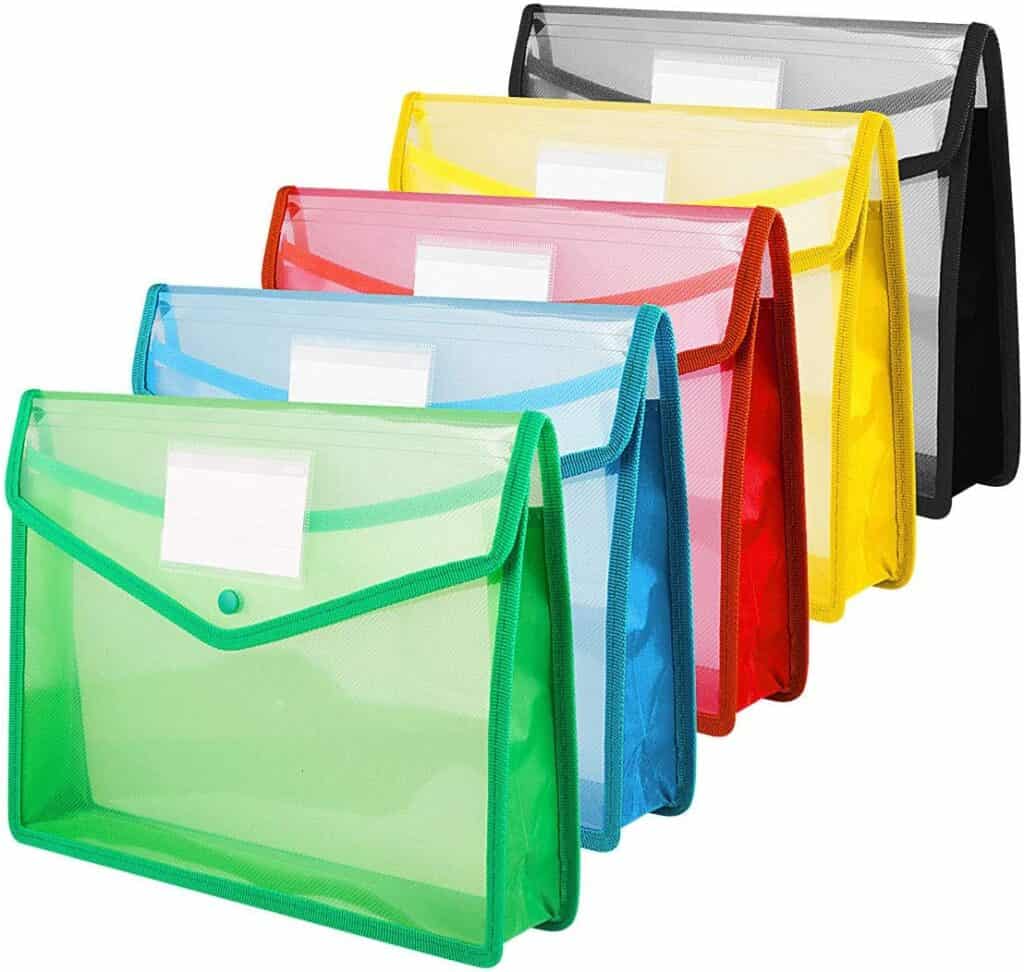
You can
color-code your files into four categories: working, drafts, archive, and household.
| Categories | Purpose | |
|---|---|---|
| 1 | Working | Files that you are currently working on. |
| 2 | Drafts | Works that are pending or need approvals. |
| 3 | Archive | Files of completed projects. |
| 4 | Household | Files that concern family health, taxes, and so on. |
You can find these folders on amazon.
You can creatively color code your files using Colorful sticky notes. Also check other article: How to Use Sticky Notes Creatively for your Home Office?
2. Label Your Files
Labels are words or phrases which represent the characteristics of your files. It is a simple, flexible tool that allows you
hassle-free file search. Think about the size of the letters and the use of singular or plural terms. In addition, you should consider the following: Will you use nouns, verbs, adjectives, or a combination?
Are you going to capitalize the letters? Again, consistency is vital for easy finding.
If you have made a lengthy list of labels you want to use, having a note of them will help you keep track of them. You can even label your files within the color-coded folders.
The following list may provide you with some background on labeling your files.
- Inspiration: These include reference files or articles used in projects.
- Main files: Files regarding your main task.
- Expenses: This is for finance-related files, Eg-Health insurance and taxes.
- Record: This one is mainly for the archive folder to distinguish files needed to be permanently stored.
3. Use Binders
You may prepare various binders for situations when you are in a rush or even during emergency cases.
For example, if you have an urgent meeting in the morning, you can grab the binder with the necessary files and get going.
You can make binders for medical emergencies so that you have data on someone’s medical history at once. The method can also do the same for financial works or event planning.
As mentioned above, you can keep the files needed for a meeting in a binder the day before. So, even if you run a bit late, you can be assured you have all the necessary details.
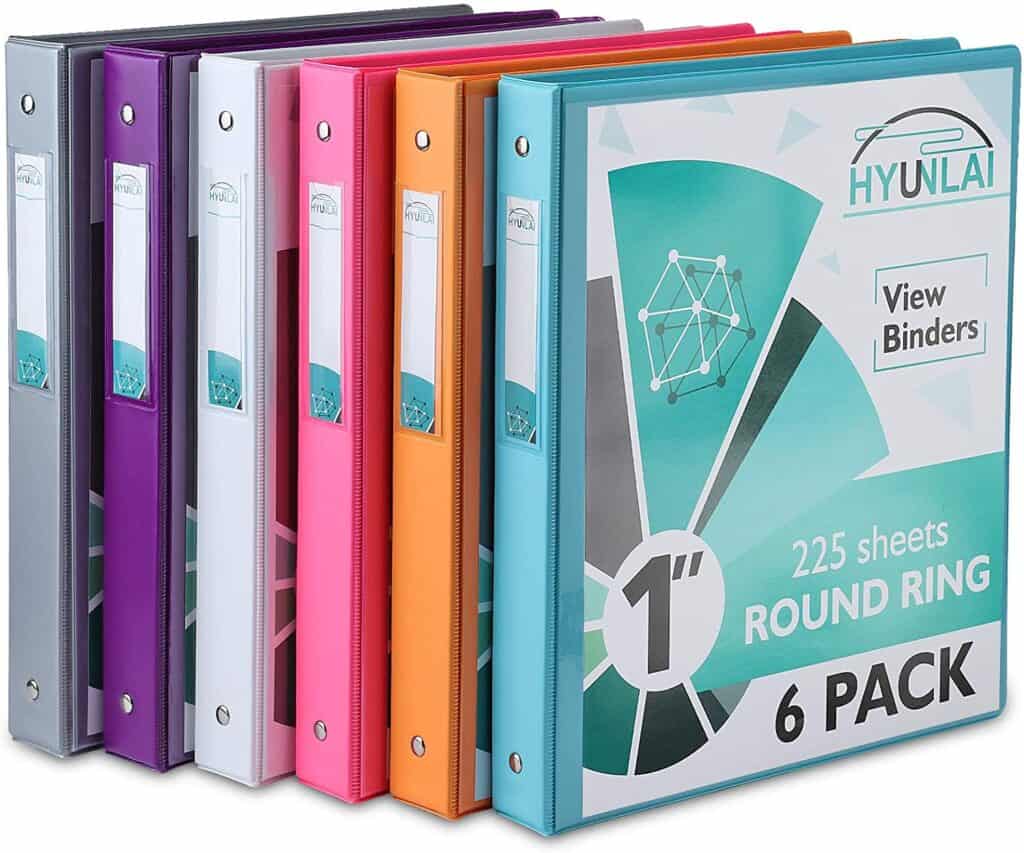
You can find binders on amazon.
Read More: How to Bind Papers Without Binding Machine?
4. Arranging Stationery Products
Stationery is one of the most essential yet easily misplaced items in an office.
Therefore, you need to dedicate a drawer in your desk or your cabinet for stationery items only to categorize them.
Once you have done that, you can go through everything you possess.
For example, you can use dividers for your drawers, numerous plastic baskets for your cabinet, and holders for items on your desk.
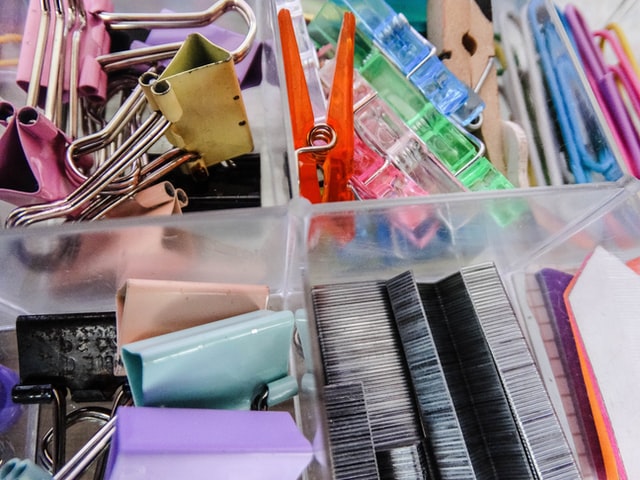
Put all similar items in one place. For example: keep all the pens in one basket or the staplers and stapler pins in one place. This keeps your space tidy.
You can even find see-through plastic baskets that will help you to organize your colored pens and highlighters. Also, ensure you have extra supplies for the things you use the most.
Lastly, put a label or tag on the holders so that you find your things quickly.
Here are some amazon links- holders, drawer dividers, plastic baskets/tubs.
5. Organizing Personal Files
You might use folders or binders for this. There is no hard and fast rule for this. So, you can use one or more folders to store these documents.
The primary purpose is to categorize files needed to be well-protected. For example, you may want to keep all your credentials in one big file and store it in a secure vault or safe.
You should safely preserve other personal files, including identification, birth certificates, etc.
You can also store business cards from your clients or significant phone numbers in one big folder.
Other Organizing Tips for your Home Office
This section provides details on appropriate storage spaces and their uses.
1. Using Cabinets
Cabinets are a basic necessity of any office. You can invest in a cabinet that fits the aesthetic of your room. But make sure that the cabinet has enough space to put all your files.
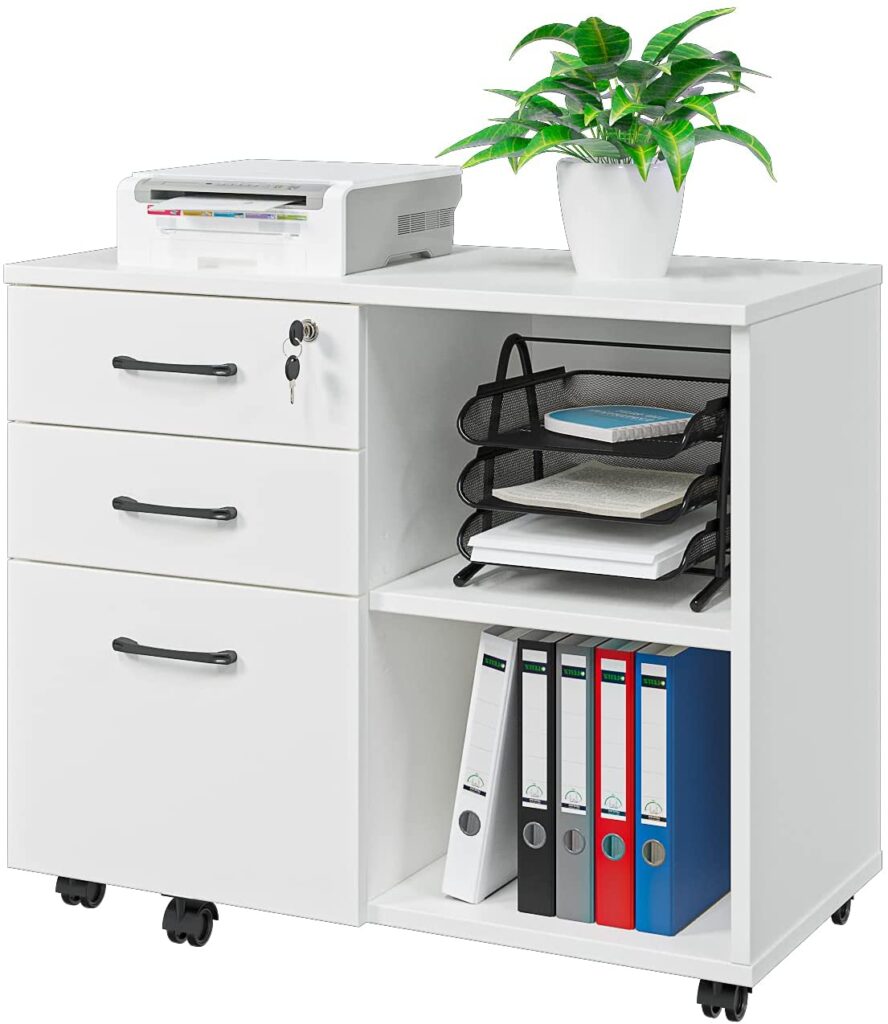
Finding a fireproof cabinet with a safe or lockbox built into it is even better.
This will assure you that your files remain guarded at all times.
You can put your most important files in the safe or vault and organize the rest in drawers and shelves.
But, preferably, it would be best if you placed the cabinet near your working station.
Having a clear map of which documents go in which area would be best. Don’t just throw all your documents into the cabinet. It can be done according to your needs and preferences.
Here is some file cabinets recommendation for your home office.
| Product | Specification | Image |
|---|---|---|
| Bush Furniture Cabot 2 Drawer Lateral File Cabinet | Espresso Oak, ANSI/BIFMA standards, 2 drawers, 30.16" x 60lb. Holds letter, legal, and A4 files | 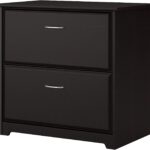 |
| DEVAISE Wood File Cabinet | 2 large drawers with lock, 23.6" W x 15.7" D x 29.3" H, 220lbs, eco-friendly wood material | 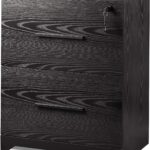 |
| Bonnlo 2-Drawer Lateral File Cabinet | 35.5"W x 17.7"D x 28.75"H, 330lb, center lock system, one-year warranty | 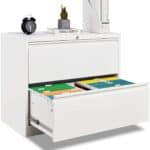 |
| HON Brigade 600 Series File Cabinet | Choose from 2-5 drawers, Clean metal finish, heavy-duty, 18 x 36 x 39.13 inches | 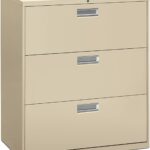 |
| Storex Plastic Two-Drawer File Cabinet | Polished plastic, removable casters, fits all sizes of files, 18-1/4 x 14-3/4 x 25-1/2 Inches | 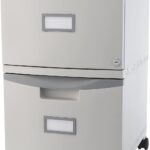 |
| Lorell 14341 18 Deep 2-Drawer File Cabinet | Two drawer file cabinet, Steel construction, glide suspension, 14.3" x 18" x 24" | 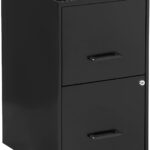 |
Discover more on: Are File Cabinets Fireproof?
2. Wall Space Uses
Most of us buy cabinets to increase our storage space, but wall space can also be well utilized.
For example, you can use walls to hang calendars, shelves, whiteboards, metal grids, etc.
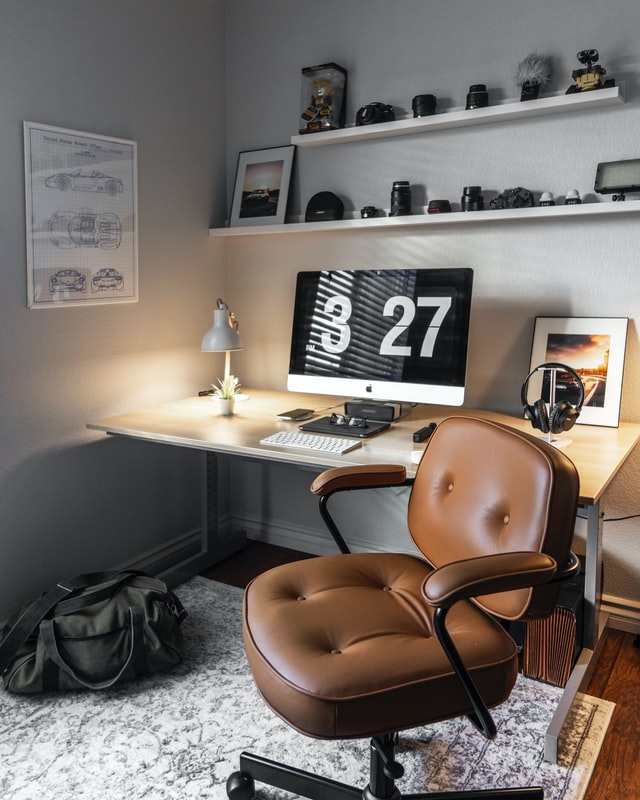
If your desk faces a wall, you can use the extra space for reminders, notes, calendars, and whiteboards. This way, you will be reminded repeatedly about your tasks and deadlines.
Some people also like to hang up motivational quotes or family pictures.
These days, shelves and metal wall grids are also popular in home offices. We can use these shelves to store stationery supplies or even books.
In a wall grid, you can add pictures, badges, to-do lists, sticky notes, etc. But, of course, it would be best if you organized it according to your liking.
Discover more on: What is the Best Wall Color for Home Office?
3. Add a Mail Station
If you have enough space in your home office, a mail station can add more control over the papers that come in or go out.
You may use a small desk or shelf for this. In addition, your printer can go in this area.
Separate your mail into incoming and outgoing. Similarly, you can do this for all your family members as well. You can make a plan for the placement of the mail.
After organizing your mail in this order, you might never want to return to your old habits. This is a simple yet effective way to organize mail as soon as it arrives.
Then, you will never misplace your stuff with your family members and never forget to send mail on time.
4. Add a Trashing Station
Suppose you don’t manage your home office trash files or other unnecessary items. Soon, you will collect a huge mess that can’t be decluttered easily.
A trashing station doesn’t necessarily mean you must dedicate a large area. For example, add some trashcans there if you have a desk with free space beneath it. Then, on the desk, you can make space for your shredder.
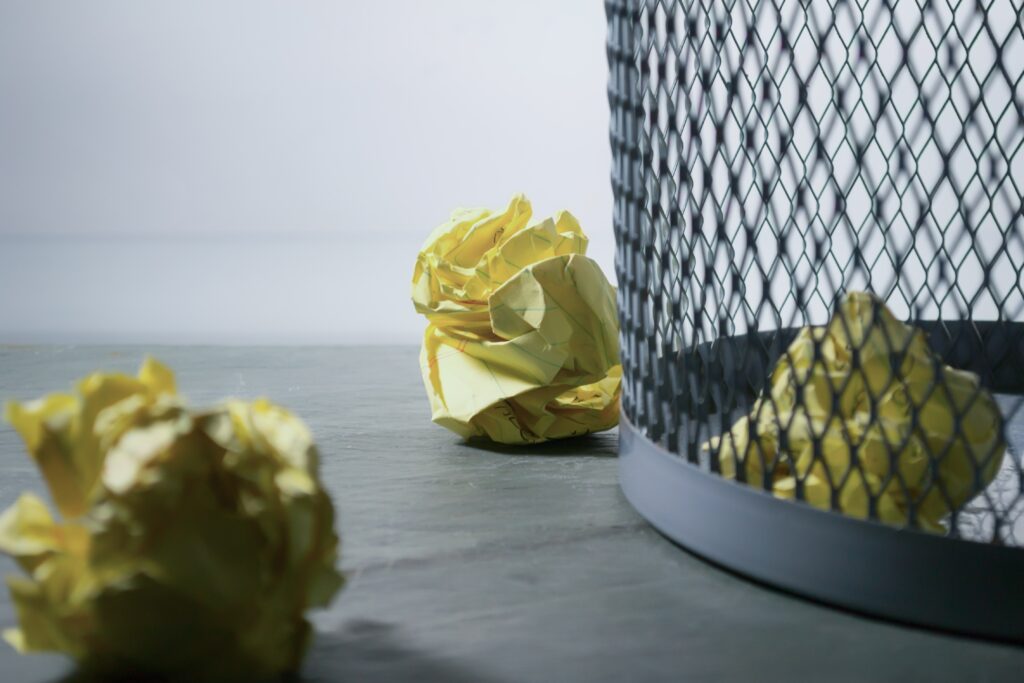
You can add two containers; one for paper and one for other junk. Having an excellent disposing system is essential to remove unwanted litter.
After organizing this space, please go through the files collected once a week and shred or discard them.
5. Keep Your Desk Organized
Your desk must be the most organized place in your home office.
It is the place where you work on projects and makes crucial decisions. So, a messy desk can overwhelm you while working.

You can use pen holders with multiple sections as well as utilize your drawer space.
The items that you used the most must be kept on the desk. These include your computer setup, lamps, pens, sticky notes, and calendars, to name a few.
Most people have a drawer in their desks. You can use this space to put your folders, binders, cards, and extra stationery supplies.
Don’t forget to put the things back in their designated areas after use. Once a week or so, go through your stuff on your desk and throw out pens that don’t work, unneeded papers, etc.
Also, wipe your desk, keyboard, mouse, and phone using disinfectant wipes now and then. A clean working area helps to stay focused for longer hours.
We have a perfect masterpiece if you want to make your desk look minimalist.
Go thorugh: How can I Make my Home Office Desk Look Minimalist?
How to Organize an Electrical Filing System?
Technological advancement has also allowed us to go digital with our documents. Most people prefer to go paperless these days.
Storing digital files takes less time and effort; however, these files are still vulnerable.
Here are some tips for managing your electrical filing system.
- Your crucial documents must be backed up using external drives and cloud storage.
- Check emails daily and sort them as needed. You should view and delete unimportant emails once a month.
- Like you trash old files, you should review your desktop once every two weeks and delete unused and unwanted files.
- You can use as many wireless devices as you want to reduce the cables and wires in your way. Using a USB hub can also significantly reduce cable clutter.
- You can prevent fires and short circuits using surge-protected power bars to plug in your remaining cable.
Conclusion
Files and documents are a massive part of our office; taking care of them is our responsibility. You can’t focus if you have a vast pile of paperwork waiting to get decluttered.
The secret to success is how you organize your personal and professional life.
Hence, filing is an essential skill in today’s world. The faster you start organizing your work, the better your performance will be. In addition, your success will also reach new heights.
I hope this article has given you all the key points to remember while setting up your home office filing system.
After that, you must experiment with different techniques before finding something that works best for you.
Make sure that you incorporate the best methods. You will have a systematic filing system in no time!
Read more: 10 Reasons why your desk is always messy


